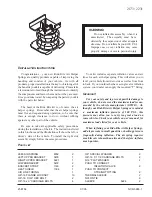
WARNING!
The temperature grade for this tire is
established for a tire that is properly
inflated and not overloaded. Exces-
sive speed, under-inflation, or exces-
sive loading, either separately or in
combination, can cause heat buildup
and possible tire failure.
STORING THE VEHICLE
If you are storing your vehicle for more than 21 days, we
recommend that you take the following steps to mini-
mize the drain on your vehicle's battery:
•
Disconnect the negative cable from battery.
•
Any time you store your vehicle or keep it out of ser-
vice (i.e., vacation) for two weeks or more, run the
air conditioning system at idle for about five minutes
in the fresh air and high blower setting. This will
ensure adequate system lubrication to minimize the
possibility of compressor damage when the system
is started again.
BODYWORK
PROTECTION FROM ATMOSPHERIC
AGENTS
Vehicle body care requirements vary according to geo-
graphic locations and usage. Chemicals that make
roads passable in snow and ice and those that are
sprayed on trees and road surfaces during other sea-
sons are highly corrosive to the metal in your vehicle.
Outside parking, which exposes your vehicle to airborne
contaminants, road surfaces on which the vehicle is
operated, extreme hot or cold weather and other
extreme conditions will have an adverse effect on paint,
metal trim, and underbody protection.
The following maintenance recommendations will
enable you to obtain maximum benefit from the corro-
sion resistance built into your vehicle.
What Causes Corrosion?
Corrosion is the result of deterioration or removal of
paint and protective coatings from your vehicle.
The most common causes are:
•
Road salt, dirt and moisture accumulation.
•
Stone and gravel impact.
•
Insects, tree sap and tar.
•
Salt in the air near seacoast localities.
•
Atmospheric fallout/industrial pollutants.
BODY AND UNDERBODY
MAINTENANCE
Cleaning Headlights
Your vehicle is equipped with plastic headlights and fog
lights that are lighter and less susceptible to stone
breakage than glass headlights.
Plastic is not as scratch resistant as glass and there-
fore different lens cleaning procedures must be
followed.
To minimize the possibility of scratching the lenses and
reducing light output, avoid wiping with a dry cloth. To
remove road dirt, wash with a mild soap solution fol-
lowed by rinsing.
Do not use abrasive cleaning components, solvents,
steel wool or other aggressive material to clean the
lenses.
Tri-Fold Soft Tonneau Cover Care —
If Equipped
For cleaning and protecting the vinyl Tri-Fold Tonneau
cover, use Mopar® Whitewall & Vinyl Top Cleaner and
Mopar® Leather and Vinyl Conditioner/Protectant.
PRESERVING THE BODYWORK
Washing
•
Wash your vehicle regularly. Always wash your
vehicle in the shade using Mopar® Car Wash, or a
mild car wash soap, and rinse the panels completely
with clear water.
•
If insects, tar, or other similar deposits have accu-
mulated on your vehicle, use Mopar® Super Kleen
Bug and Tar Remover to remove.
326
SERVICING AND MAINTENANCE
















































